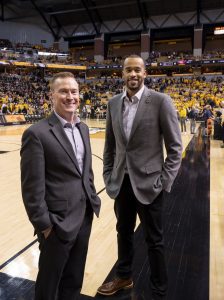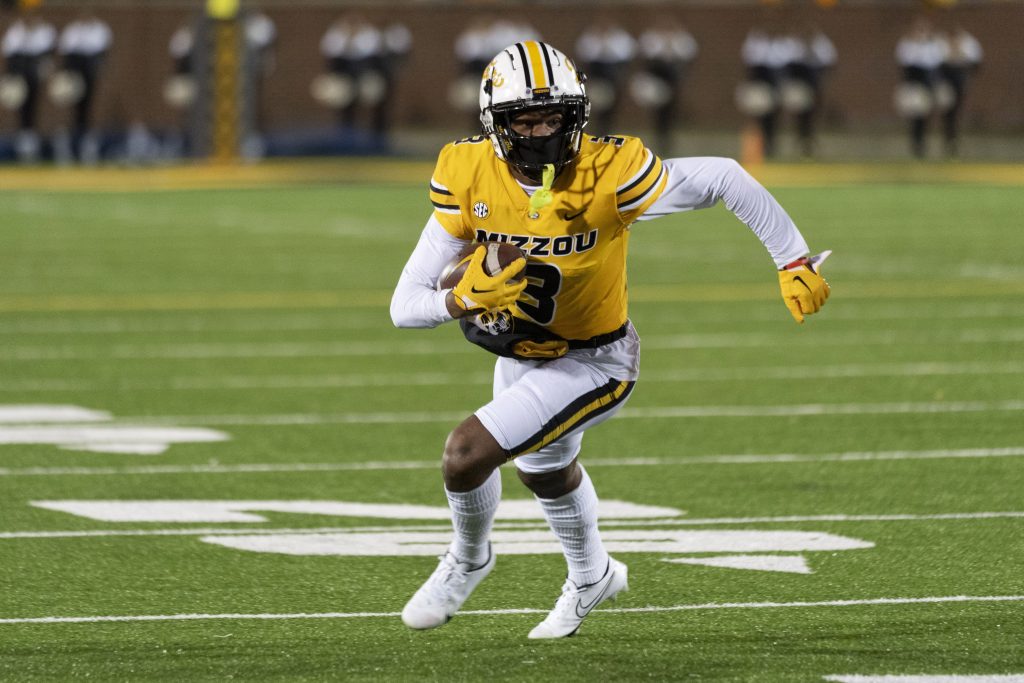Photos by L.G. Patterson
On a recent afternoon, Nick Garner, CEO of Every True Tiger Foundation (ETTF), sits in his office, a couple miles from the University of Missouri—Columbia campus, talking with potential donors, introducing them to the organization and asking them to support the foundation. Already in the first month, several major groups have gotten on board — Boys and Girls Clubs, the Black Law Students Association, Daydreams Foundation and United Community Builders.
A lot is riding on Garner’s calls. ETTF will soon have a direct impact on the student athlete experience at MU, on Mizzou athletic teams and on nonprofit organizations that would like to engage student athletes to promote their causes in their community. And all because of something known as NIL.
For college athletes, the three most important letters in the alphabet may be NIL, which stands for Name, Image and Likeness. This acronym is putting money — some big sums, but mostly small amounts — in the pockets of thousands of student athletes across the country. But for most student athletes, NIL isn’t all about the money. Foundations such as ETTF are ensuring that NIL can connect student athletes to meaningful community involvement, along with a chance to raise their social networking profile and to learn how to manage finances.
Garner leads a foundation that is only several months old but has the potential to make a significant contribution to student athletes and nonprofits in Boone County, the state and even to nonprofits in other states. Although he coordinates his activities with the MU athletic department, he is independent of it and not a university employee. Before heading ETTF, he spent 16 years with Learfield, launching that company’s NIL strategy. In the process, he has trained more than 180 groups on the ins and outs of NIL and its impact on college athletes.
“The unique thing about NILs is that they open up opportunities that never existed before,” Garner says.

Since the days of Babe Ruth, professional athletes have made fortunes endorsing products and licensing their NILs to national brands, such as Nike or Wheaties. But college athletes were prohibited by the NCAA from doing the same thing if they wanted to keep their amateur status. On July 1, 2021, everything changed. That’s when NCAA rules went into effect that allowed college athletes to receive compensation beyond tuition.
College athletes throughout the nation are now exploring their options for making money while attending school. Those options include charging for endorsements, being paid for attending an event, signing autographs for fees, running sports camps and giving “shout outs” to fans on social media platforms. In the first year since this possibility was available, college athletes earned a total of about $917 million, according to Yahoo Finance. While ETTF focuses exclusively on nonprofit engagements, another side of the collective, Advancing Missouri Athletes (formed in 2021) links students with for-profit corporations and businesses seeking to use Mizzou athletes’ NILs.
Greg Steinhoff led the effort to establish ETTF. “I thought Mizzou was in a really good spot to show how NILs should be presented and utilized by student athletes. There has been a lot of work to make sure it helps them in more ways that just giving them a check. It’s been under the radar so far, and it’s already had quite a bit of success,” he says.
Steinhoff is enthusiastic about ETTF and how it can affect Mizzou’s student athletes, but he acknowledges that it took a while for him to get used to the idea of students earning money with their NILs. “Originally, I was more old school about sports. But I understand the frustration students felt when they’d see a jersey with their name on it in a video game and they received nothing in return. And you have to realize that some of our student athletes come from backgrounds where they have to work hard to get somewhere in the world. Now they can profit off their NILs,” he says.
The students get more than extra money from the NIL rule change. “It opens the world to them and it gives the community the benefit of both helping the athlete and helping their clients,” Steinhoff says. “If you’re in a sport, you’re pretty much in a bubble — it’s go to class and then practice. Every True Tiger Foundation will give them the opportunity to get involved with people and social structures they would not normally engage with. It can be beneficial long after they have graduated.”
ETTF is Mizzou Athletics’ preferred collective for linking students with NIL opportunities. Here’s how the ETTF works: ETTF builds a portfolio of charitable organizations that would benefit by having Mizzou student athletes promote the mission of that particular organization, maybe by making an appearance or speaking at one of their events. ETTF then aligns student athletes with charities each month to promote initiatives via social media or live appearances. After the student athlete completes his or her obligations to the nonprofit, the athlete is then paid by ETTF. Not all students are paid at the same rate. A softball player may charge a different rate than a star football player. “We raise and help distribute the funds,” Garner says, “and we have charitable partnerships throughout the community and state.”

The impetus for the match of student to nonprofit may come from the student instead of the nonprofit. “A student may have worked with a group, such as Boys and Girls Club at home in St. Louis and might be looking to continue that work here in Columbia,” Garner says.
Donors to ETTF can choose what sport programs will benefit from their donation. “For years, donors could not have a direct impact on a program or an athlete. ETTF offers the first opportunity where people can impact the athletic program of their choice and impact those students directly,” Garner says.
Garner stresses that it’s not just the major donors who can help out. “For anyone who cares about Mizzou, this is an opportunity to have a stake in the competitiveness of Mizzou for years to come,” he says. “This collective brings together the resources of Mizzou fans alike, in an effort to create as many NIL opportunities as possible for Mizzou student athletes.”
Collectives, such as ETTF, are becoming more popular by the day. “There are about 300 or so different collectives,” says Michelle Myer, NIL administrator and founder of NIL Network website. “Right now, there’s all this excitement because it’s new. But you have to remember that it all goes back to recruiting and how colleges can demonstrate to these up-and-coming athletes that this particular school will be offering this option.”
Garner recognizes that the NIL changes are so new that it’s taking a while for colleges, students and athletic boosters to grasp the new possibilities. “This is an industry that is very much in its infancy stage, but it’s here to stay. My hope is that the business community and Mizzou stakeholders in general embrace our mission of providing student athletes the opportunity to impact their community, which will in turn make Mizzou competitive among their peers,” he says.
Amateurs No More: Clearing the Path to Money for College Athletes

Shortly after World War II, the NCAA adopted rules to ensure that college athletes competed as amateurs and could not receive compensation for the use of their NILs. Those rules were set aside on July 1, 2021, when the NCAA ushered in a new era, in which student athletes could receive compensation beyond tuition. Because several states had already changed laws allowing student athletes to benefit from the use of the NILs, the NCAA was pressured into this change, fearing that those states would have a competitive recruiting advantage over those states that maintained the status quo. In addition to state law changes, the Supreme Court had just ruled in NCAA v Alston that the NCAA could not enforce its rules that limited education-related benefits for athletes. In explaining the court’s decision, Justice Neil Gorsuch wrote that the NCAA could not be exempt from antitrust laws. Universities, alumni groups, broadcaster networks and others in the sports industry would no longer be the only ones profiting from college athletes. Now student athletes themselves could begin earning money for the use of their name, image and likeness. After the decision, more states, including Missouri, began creating laws that clarified what colleges and students could and could not do.
Regardless of state laws and college rules, the NCAA still prohibits pay-for-play arrangements, in which schools would entice athletes by paying them to attend a particular college. Schools also are prohibited from paying students based on their performance.




















